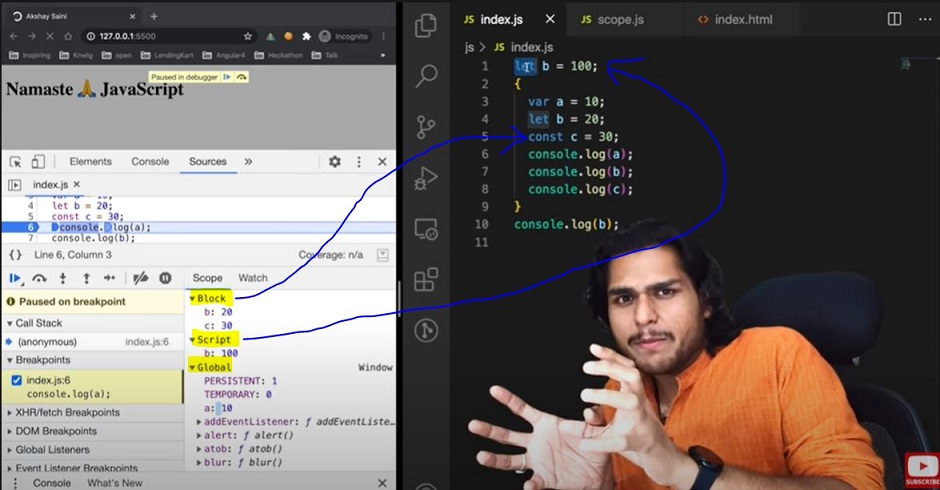Episode 9 : Block Scope & Shadowing in JS
What is a Block?
Block aka compound statement is used to group JS statements together into 1 group. We group them within {...}
{
var a = 10;
let b = 20;
const c = 30;
// Here let and const are hoisted in Block scope,
// While, var is hoisted in Global scope.
}Block Scope and its accessibility example
{
var a = 10;
let b = 20;
const c = 30;
}
console.log(a); // 10
console.log(b); // Uncaught ReferenceError: b is not definedReason?
In the BLOCK SCOPE; we get b and c inside it initialized as undefined as a part of hoisting (in a seperate memory space called block)
While, a is stored inside a GLOBAL scope.
Thus we say, let and const are BLOCK SCOPED. They are stored in a separate mem space which is reserved for this block. Also, they can't be accessed outside this block. But var a can be accessed anywhere as it is in global scope. Thus, we can't access them outside the Block.
What is Shadowing?
var a = 100;
{
var a = 10; // same name as global var
let b = 20;
const c = 30;
console.log(a); // 10
console.log(b); // 20
console.log(c); // 30
}
console.log(a); // 10, instead of the 100 we were expecting. So block "a" modified val of global "a" as well. In console, only b and c are in block space. a initially is in global space(a = 100), and when a = 10 line is run, a is not created in block space, but replaces 100 with 10 in global space itself.So, If one has same named variable outside the block, the variable inside the block shadows the outside variable. This happens only for var
Let's observe the behaviour in case of let and const and understand it's reason.
let b = 100;
{
var a = 10;
let b = 20;
const c = 30;
console.log(b); // 20
}
console.log(b); // 100, Both b's are in separate spaces (one in Block(20) and one in Script(another arbitrary mem space)(100)). Same is also true for *const* declarations.
Same logic is true even for functions
const c = 100;
function x() {
const c = 10;
console.log(c); // 10
}
x();
console.log(c); // 100
What is Illegal Shadowing?
let a = 20;
{
var a = 20;
}
// Uncaught SyntaxError: Identifier 'a' has already been declared- We cannot shadow let with var. But it is valid to shadow a let using a let. However, we can shadow var with let.
- All scope rules that work in function are same in arrow functions too.
- Since var is function scoped, it is not a problem with the code below.
let a = 20;
function x() {
var a = 20;
}
Watch Live On Youtube below:
